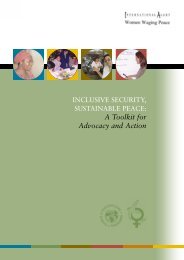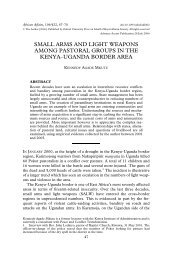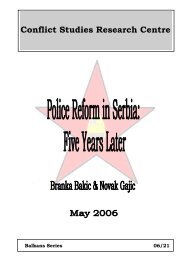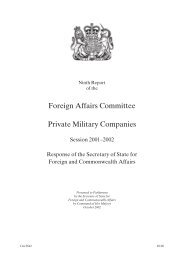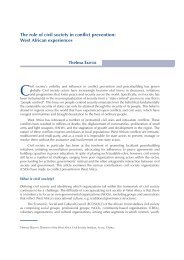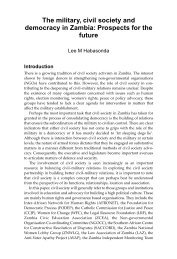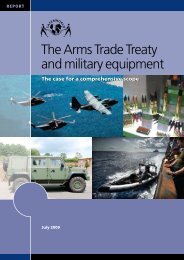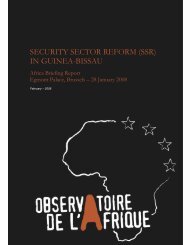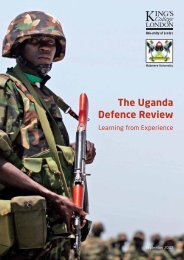promoting security sector reform in fragile states - GFN-SSR
promoting security sector reform in fragile states - GFN-SSR
promoting security sector reform in fragile states - GFN-SSR
You also want an ePaper? Increase the reach of your titles
YUMPU automatically turns print PDFs into web optimized ePapers that Google loves.
Furthermore, USAID has considerable<br />
experience work<strong>in</strong>g across <strong>sector</strong>s.<br />
For example, <strong>promot<strong>in</strong>g</strong> susta<strong>in</strong>able<br />
agriculture requires technical support<br />
to farmers; attention to environmental<br />
management; economic policies that do<br />
not discrim<strong>in</strong>ate aga<strong>in</strong>st smallholders or<br />
the rural <strong>sector</strong>; and sound governance<br />
at national, regional, and local levels.<br />
The concept of draw<strong>in</strong>g on different<br />
areas of expertise to achieve an objective<br />
is consequently well understood<br />
with<strong>in</strong> the Agency. The on-the-ground<br />
presence of USAID staff also is vital<br />
for understand<strong>in</strong>g critical relationships<br />
among local stakeholders and historical<br />
and cultural environments where<br />
development takes place. Last—but by<br />
no means least—USAID has experience<br />
<strong>in</strong> build<strong>in</strong>g capacity of weak <strong>in</strong>stitutions.<br />
Such experience is critically important<br />
<strong>in</strong> develop<strong>in</strong>g the proficiency of civil<br />
authorities to manage and oversee the<br />
<strong>security</strong> <strong>sector</strong>.<br />
Develop<strong>in</strong>g Key Partnerships<br />
Effective <strong>SSR</strong> assistance requires <strong>in</strong>puts<br />
from a broad spectrum of functional<br />
expertise. In turn, this requires develop<strong>in</strong>g<br />
partnerships with<strong>in</strong> <strong>in</strong>dividual donor<br />
governments and among other external<br />
actors. Partnerships with other donor<br />
governments and multilateral bodies<br />
that provide <strong>SSR</strong> support are especially<br />
critical for USAID, given its limited<br />
budget and the likelihood that develop<strong>in</strong>g<br />
a critical mass <strong>in</strong> favor of <strong>SSR</strong><br />
with<strong>in</strong> other key U.S. departments and<br />
agencies will take some time. Internal<br />
partnerships among U.S. departments<br />
and agencies are needed to develop a<br />
coherent approach to <strong>SSR</strong> and effective<br />
implementation.<br />
In many <strong>fragile</strong> <strong>states</strong>, <strong>security</strong> forces enjoy<br />
considerable political and economic<br />
autonomy. They often play a direct<br />
or <strong>in</strong>direct role <strong>in</strong> the political system,<br />
gravely complicat<strong>in</strong>g efforts by <strong>reform</strong>m<strong>in</strong>ded<br />
civil authorities to <strong>in</strong>troduce or<br />
strengthen the rule of law or democratic<br />
process. <strong>SSR</strong> thus <strong>in</strong>volves help<strong>in</strong>g<br />
to modify attitudes and behavior of<br />
<strong>security</strong> force personnel so that they<br />
support—rather than underm<strong>in</strong>e—<br />
accountable, transparent, democratic<br />
governance.<br />
Personnel from the U.S. Department<br />
of Defense, the U.S. Armed Forces, the<br />
U.S. Department of Justice, and various<br />
law enforcement bodies—<strong>in</strong>clud<strong>in</strong>g the<br />
International Crim<strong>in</strong>al Investigative Assistance<br />
Tra<strong>in</strong><strong>in</strong>g Program—have a role<br />
to play. They can also provide assistance<br />
<strong>in</strong> build<strong>in</strong>g the capacity of civil authorities<br />
to address <strong>security</strong> issues—for<br />
example, through the E-IMET program<br />
and courses offered by the regional<br />
Box 8. The U.S. E-IMET Program*<br />
Expanded IMET (E-IMET), created <strong>in</strong> 1991, is a subset of the U.S. International<br />
Military Education and Tra<strong>in</strong><strong>in</strong>g (IMET) program. E-IMET’s programs do not teach<br />
combat or technical skills, but focus on defense management, civil-military relations,<br />
law enforcement cooperation, and military justice.<br />
The education is available to foreign civilians and military personnel, <strong>in</strong>clud<strong>in</strong>g<br />
personnel with defense responsibilities <strong>in</strong> government m<strong>in</strong>istries, legislators, and<br />
nongovernmental actors.<br />
Accord<strong>in</strong>g to the U.S. Defense Security Cooperation Agency’s E-IMET Handbook,<br />
the program’s purpose is to educate U.S. friends and allies <strong>in</strong> the proper management<br />
of their defense resources, improv<strong>in</strong>g their systems of military justice <strong>in</strong><br />
accordance with <strong>in</strong>ternationally recognized pr<strong>in</strong>ciples of human rights and foster<strong>in</strong>g<br />
a greater respect for and understand<strong>in</strong>g of the pr<strong>in</strong>ciple of civilian control of the<br />
military.<br />
* <br />
strategic studies centers (box 8). These<br />
actors cannot, however, assume primary<br />
responsibility for educat<strong>in</strong>g legislators<br />
on their roles and responsibilities<br />
<strong>in</strong> develop<strong>in</strong>g and oversee<strong>in</strong>g <strong>security</strong><br />
policy; tra<strong>in</strong><strong>in</strong>g staff of auditor generals’<br />
offices on audit<strong>in</strong>g <strong>security</strong> <strong>in</strong>stitutions;<br />
or educat<strong>in</strong>g m<strong>in</strong>istry of f<strong>in</strong>ance officials<br />
<strong>in</strong> assess<strong>in</strong>g defense, <strong>in</strong>telligence, or law<br />
enforcement budgets. Help<strong>in</strong>g improve<br />
the capacity of the civil authorities to<br />
carry out these and other management<br />
and oversight tasks should be the primary<br />
responsibility of USAID.<br />
The United K<strong>in</strong>gdom is the only<br />
OECD government that has made a<br />
serious effort to develop a cross-departmental<br />
approach to <strong>SSR</strong>. Its experience<br />
illustrates many challenges that face any<br />
government seek<strong>in</strong>g to overcome the<br />
differ<strong>in</strong>g <strong>SSR</strong> perspectives of the foreign<br />
m<strong>in</strong>istry, the defense m<strong>in</strong>istry, and<br />
the development m<strong>in</strong>istry. The U.K.<br />
Department for International Develop-<br />
18 USAID ISSUE PAPER NO. 11






